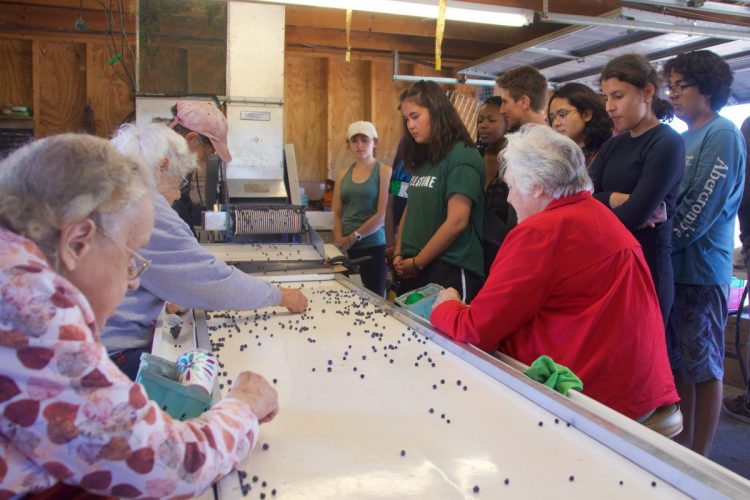ROQUE BLUFFS — Bjorn Ludwig had never seen a blueberry rake until last week.
The Columbus, Ohio, native has family in the Midwest and is familiar with farm practices there. But, he said, his experience harvesting blueberries at Welch Farm in Roque Bluffs was quite a bit different.

File photo
In the Midwest, he said, crops grow in neat rows rather than being scattered throughout the field the way wild blueberries are. The harvesting he has seen in the Midwest is typically mechanized.
Ludwig was one of 11 Bowdoin College incoming freshmen who gleaned blueberries on Aug. 30. Gleaning means harvesting crops that otherwise would have gone to waste.
The 22 boxes – 300 to 400 pints – the group picked and processed that day will be distributed to local food banks, said Regina Grabrovac, Healthy Acadia food programs manager for Washington County.
“Fresh food is really lacking in food pantries,” she said. “There’s so much more nutrition available in fresh food.”
Eating healthy food can be a challenge for people on low incomes because fresh fruits and vegetables can be more expensive than processed foods.
“We see pantry participants so pleased when they have access to fresh food,” Grabrovac said.
The Healthy Acadia gleaning program runs from July to October and includes a variety of fresh fruits and vegetables harvested from local farms.
Welch Farm owner Wayne Hanscom said that last year, processers paid 37 cents per pound for blueberries, which cost 38 cents a pound to produce. Although he makes a lot more money selling fresh berries directly to consumers, the window for selling these is relatively small.
Processors who buy intending to freeze the berries purchase much larger quantities and make up about 80 percent of the farm’s sales. Still, the revenue for berries that will be frozen is often not worth the effort.
“Many growers are finding they have to leave fields unharvested,” Grabrovac said.
Healthy Acadia started gleaning blueberries three years ago in part to call attention to the difficulties growers face because of low prices and the long wait for payment.
“Growers are sitting and waiting for a check until Christmas,” she said. “(And), they don’t have any idea what (price) they’re going to get.”
Hanscom said he didn’t get paid for last year’s crop until mid-December.
Often, Grabrovac said, she gleans berries herself or with the help of two or three volunteers. One week a season, however, she gets help from Bowdoin College, whose incoming freshmen go on a trip as part of their orientation.
“It just gives them an opportunity to learn a little bit about Maine,” she said.
This year’s group began its work at 9:30 a.m., raking until lunchtime and then taking a break on the beach at Roque Bluffs State Park. They returned in the early afternoon to process the berries, which involves removing stems, debris and unripe or overripe berries.
The students, many of whom had never tasted wild blueberries before, said they enjoyed sampling the fruit.
“They’re delicious,” said Sebastian Cisneros of Clifton, New Jersey.
“It’s hard work, though,” said Leif Maynard of Amherst, Massachusetts. “And it’s a lot of work for little gain.”
“We’ve been learning a lot about the migrant community,” said Marie-Monique Kabongo of Portland. “It really puts your life in perspective to realize how privileged we are not to have to depend on that kind of work.”
Copy the Story LinkSend questions/comments to the editors.



Success. Please wait for the page to reload. If the page does not reload within 5 seconds, please refresh the page.
Enter your email and password to access comments.
Hi, to comment on stories you must . This profile is in addition to your subscription and website login.
Already have a commenting profile? .
Invalid username/password.
Please check your email to confirm and complete your registration.
Only subscribers are eligible to post comments. Please subscribe or login first for digital access. Here’s why.
Use the form below to reset your password. When you've submitted your account email, we will send an email with a reset code.